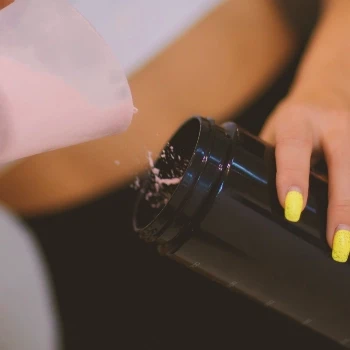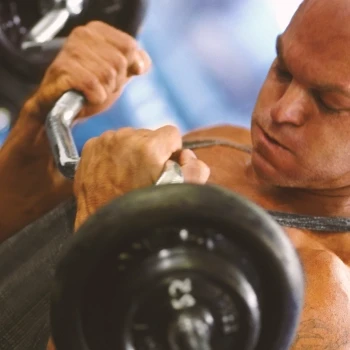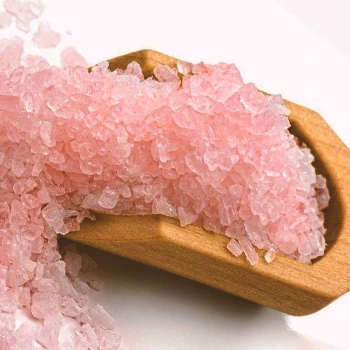Creatine hydrochloride is one of the new forms of creatine that promises to give an extra kick with less.
In my own regimen, I’ve found that Creatine HCL is engineered to deliver concentrated creatine to muscles, yet requires significantly lower doses, a balance that’s been pivotal in my training.
But, how much of the “less” should you consume?
Through my personal journey and extensive research, I’ve uncovered nuanced insights into the optimal dosage of creatine HCL, exploring its multifaceted benefits and potential side effects.
Here’s what I found.
Quick Summary
- To determine how much Creatine HCL to take, the recommended dosage is 1-2 grams per 100 lbs of lean body mass per day.
- Creatine HCL is highly soluble, leading to better absorption and effectiveness at lower doses, potentially reducing side effects like water retention and digestive discomfort.
- Creatine HCL is reported to be 60% more absorbent than creatine monohydrate, indicating higher efficiency in muscle absorption.
- In my experience, the precision in creatine HCL dosage is crucial for maximizing gym performance without the bloating commonly associated with other creatine forms.
Creatine HCL Right Dosage
Only a smaller dose of creatine HCL is needed to reap the same benefits from creatine monohydrate because it is super soluble and highly absorbent.
Supplementing with creatine works best with heavy resistance training exercises. Here’s how you should take it.

The creatine loading phase is a period when athletes or weightlifters take 20 grams of creatine monohydrate per day for 5-7 days to saturate their muscle cells of creatine.
It is said to be an effective way to get the optimal results. After loading, they should maintain a dose of 5 grams per day.
However, compared to creatine monohydrate, creatine HCL requires no loading phase. It is because it is a super-concentrated form of creatine and highly soluble.
In my experimentation and rigorous training sessions, I’ve found that a micro-dose of 1-2 grams of creatine HCL per 100 lbs of lean body mass daily strikes the perfect balance for optimal performance.
Taking small grams of supplements reduces water retention and the risk of stomach discomfort and bloating. It is also said to boost muscle strength and power.
Additionally, it is suggested to take creatine HCL as your pre-workout and post-workout supplement. On your non-training days, it is advised to take it once per day every morning.
What is Creatine HCL?
Creatine HCL emerges as a blend where the creatine molecule is bonded with hydrochloric acid, a formulation I’ve explored in depth in my training. This supplement comes in the form of pills or powder.
Having incorporated it into my regimen, I’ve experienced firsthand the transformative effects of Creatine HCL on muscle gain, strength amplification, and elevated physical performance.
From my personal journey, I’ve discovered that creatine HCL not only mirrors the effects of creatine monohydrate but also excels in absorption, minimizing the risks associated with supplementation.
Creatine HCL is a combined formula of creatine and hydrochloric acid.
To further understand the efficacy of Creatine HCL, it's essential to delve into its biochemical mechanism. The hydrochloride group enhances the stability and solubility of creatine at the molecular level, leading to improved absorption and effectiveness.
Let's break it up a bit.
How Does Creatine Work?

Creatine enhances exercise performance by increasing ATP energy production.
When our muscles run out of energy in ATP or adenosine triphosphate to perform quick and explosive movements, creatine saves the day by converting more energy or ATP, giving our muscles an extra pump.
Our bodies naturally produce creatine, however, only in a specific amount.
Beyond the natural intake from protein-rich sources like red meat and fish, my journey revealed that supplementing with creatine amplifies the body’s reserves, unleashing enhanced energy and endurance.
Check out the leading creatine supplements on the market.
Hydrochloric acid
From my deep dives into the science and personal observations, hydrochloric acid, a natural component of our digestive system, plays a crucial role not just in food digestion but in the efficacy of Creatine HCL.
It is a water-based solution of hydrogen chloride.
Hydrochloric acid is used in many ways, even in processing sugar and gelatine.
Aside from its ability to help digest food, hydrochloric acid is also known to protect our bodies from infection, fight bacteria, and increase nutrient absorption.
Creatine and Hydrochloric Acid Combined

Creatine HCL's water-solubility means quicker muscle absorption and efficacy even at lower doses.
Since it is easily dissolved and quickly absorbed, it reduces water retention, the building up of water in your muscle cells, and it helps reduce the possible risks of supplementation.
Safety and Side-Effects

Creatine supplements are known as one of the safest supplements in the market.
From my meticulous records and observations, while there are no severe health repercussions linked to Creatine HCL, I’ve noted occasional minor issues like digestive discomfort, headaches, and bloating among some users.
Creatine HCL minimizes water retention, preventing rapid weight gain.
"HCl forms need to be studied more before they can be recommended over other forms."
‒ Dr. Grant Tinsley, Assistant Professor & the Director at Texas Tech University
It is good to consider creatine monohydrate because the International Society of Sports Nutrition (ISSN) recently concluded that it is still the safest and best form of creatine.
While Creatine HCL is renowned for its benefits, a comparative analysis with other forms like creatine nitrate, buffered creatine, and liquid creatine offers a broader perspective. Each variant has its pros and cons, absorption rates, and efficacy rooted in science.
Uses of Creatine Hydrochloride
Athletic and Gym Performance
In my relentless pursuit of peak performance, Creatine HCL has proven to be a powerhouse, elevating the exercise intensity and outcomes for athletes and fitness aficionados alike.
Because taking creatine gives our bodies strength, power, and endurance to perform high-intensity exercise, athletes can sprint faster or jump higher.
In addition, one study published by the National Library of Medicine shows that people who took the supplementation demonstrated an improvement in performing bench press [1].
4 Major Benefits of Creatine HCL

1. Increase Muscle Mass and Strength
If you want to increase your lean muscle mass, reduce fat, and boost muscle strength, creatine may do the job.
It helps your muscle grow bigger and stronger to perform heavy resistance training for an extended period. With this, you can reach your bulking and fitness goals more effectively and at a shorter time span.
2. Faster Absorption
One reported benefit of Creatine HCL is that it is 60% better absorbent than creatine monohydrate.
It also means it has high cell permeability meaning the substance can easily pass through the muscle cell; therefore, our bodies absorb the substance better and reduce the wasted amount.
3. Potentially Reduce the Side Effects of Monohydrate

Creatine HCL is reported to be 40 times more soluble compared to creatine monohydrate because of the hydrochloric acid component.
Because it mixes well with water, our bodies can easily absorb it, and we can take the supplement at a lower dosage.
Taking it at a lower dosage may reduce the risks of the supplementation.
4. Improve Muscle Recovery
Having pushed my limits in the gym, I can attest that creatine is a game-changer, accelerating recovery post-workout and enhancing performance, setting it apart from other supplements.
FAQs
When To Take Creatine HCL?
Take creatine HCL before a workout and after a workout. During your non-training days, you still need to take the supplements once a day.
How Long Does Creatine HCL Work?
Creatine HCL will take at least a week or two to work. It takes some time for creatine to saturate your muscles, so you'd have to wait a while to feel its benefits.
How Should I Take Creatine HCL?
You should take creatine HCL by consuming only 1-2 grams per 100 lbs of body weight per day. Creatine HCL can be ingested by mixing it with water or any other beverage.
Aim to be as constant as possible when it comes to Creatine HCL supplementation.
Is Creatine HCL Better Than Creatine Monohydrate?
Creatine HCL isn't better than creatine monohydrate because both work effectively. No official study has been done to determine which is safer and better between the two forms.
However, creatine HCL is 40 times more soluble and 60% better absorbent than creatine monohydrate, reducing water retention.
Reference:
- https://pubmed.ncbi.nlm.nih.gov/20026378
About The Author
You May Also Like







The article is great. The question, how much creatine HCl should I take was answered.
Thanks for this! Now I know what is creatine hydrochloride used for.